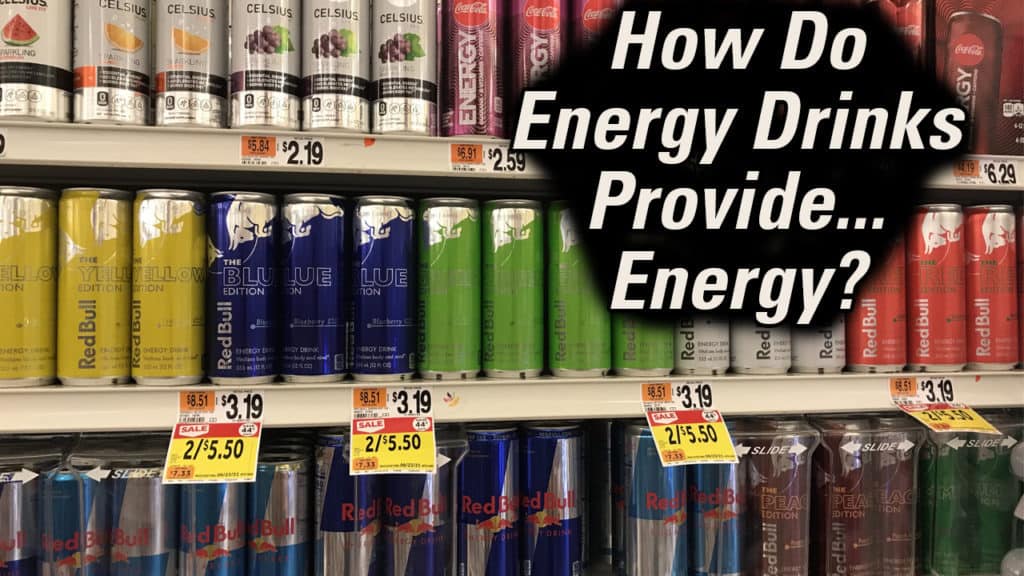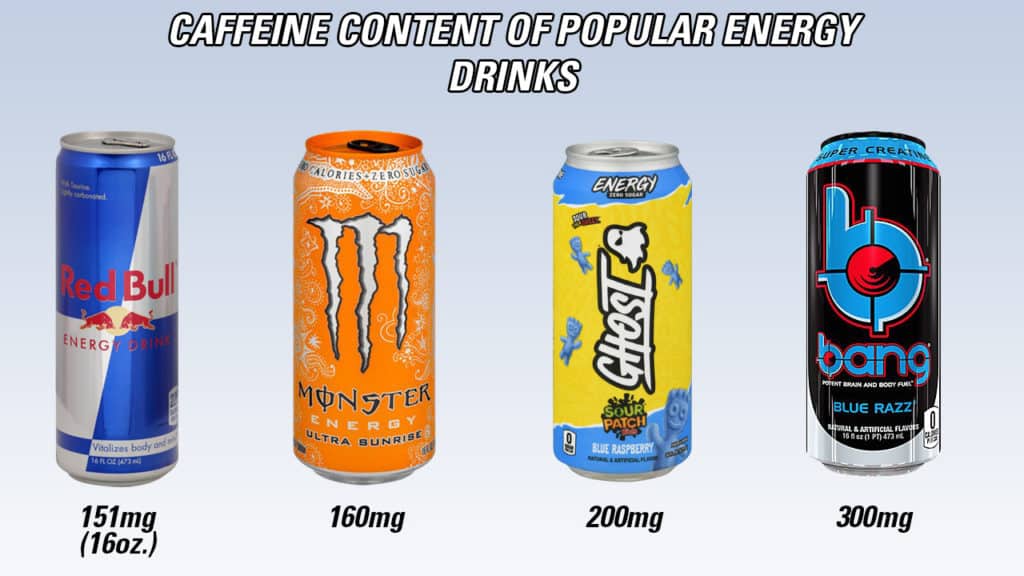
Energy drinks are a popular pick-me-up in the morning or midday, particularly for people who don’t enjoy the taste of coffee. There are countless brands available in every convenience store, supermarket, gym, and supplement shop.
Given its huge market cap (valued at $57 billion), there’s little doubt that energy drinks are effective in what they’re designed to do. But some may be unaware of how exactly energy drinks provide energy.
The main way energy drinks provide energy is from caffeine. Caffeine increases adrenaline and also inhibits adenosine, a molecule in the brain that makes you tired as the day progresses. Some energy drinks also contain sugar which is an energy source for physical and mental activity.
Any energy drink that is calorie free will provide energy strictly by means of the caffeine. Caffeine content can range from as little as 80 mg per serving to as much as 350mg. By comparison, an 8 oz. cup of coffee is about 120mg of caffeine.
You may commonly hear that a cup of coffee is 80mg of caffeine. This is typically a lowball figure, which is why 120mg is more accurate. Popular places like Starbucks definitely make their coffee stronger than the norm.
The general recommendation is for an individual not to exceed 400mg of caffeine per day. This may seem like a staggering amount, but it truly isn’t. It’s not uncommon for someone to have 3-4 cups of coffee throughout the work day.
How Does Caffeine Provide Energy?
In the body, caffeine works to provide energy in two different ways.
The more direct route in energy production is caffeine’s ability to increase adrenaline. Adrenaline increases focus, alertness, heart rate, and blood flow. An adrenaline rush is also known as the fight or flight response.
Of course, having a red bull doesn’t make you feel like you’re skydiving. There are levels to adrenaline production. The general feeling is the same, just to a lesser degree.
Caffeine also works on the adenosine receptors in the brain. In a normal circumstance, adenosine binds to these receptors throughout the day, causing you to become tired and sleepy. Caffeine has the ability to block adenosine from attaching to these receptors (temporarily).
This is how caffeine can affect sleep, even when taken hours before you go to bed. Caffeine has a half life of about 6 hours; meaning it takes 6 hours for half of the caffeine to leave your system. Even though you may not feel the effects of caffeine late in the day, it is still present in the body.
Caffeine has been shown to improve both physical and mental performance. You’d be hard pressed to find someone that could not benefit from more energy for their mind or body. This is why it is such a popular drink, whether in the form of coffee, energy drinks, pills, or pre workout supplements.
Benefits of Energy Drinks
Energy drinks have garnered a bad reputation among some of the general public. They are seen as unnatural or unsafe. However, energy drinks are perfectly fine to consume so long as it is a reasonable amount.
The teenager who makes headlines after experiencing an adverse response from guzzling 10 red bulls in a row does not represent the typical user. Anyone who abuses any sort of supplement will face a health risk. In moderation, not only are energy drinks safe, they provide a range of benefits.
Energy drinks allow someone to perfectly tailor their caffeine consumption. The caffeine content of coffee depends on a number of factors, like how long the beans are roasted for. This information may not be available to the end user. However, an energy drink will have the exact caffeine content right on the label.
Some days you may only need a slight boost from caffeine. You could opt for the smaller sized can or simply measure out exactly how much you want. On days you are especially tired; you could opt for the larger version or have multiple servings (provided it’s not an unreasonable amount).
The main difference between coffee and energy drinks is that coffee contains naturally occurring antioxidants. However, energy drinks aren’t just a concoction of caffeine and sugar. Many energy drink brands have comprehensive ingredient profiles that provide a great deal of benefit.
Energy drinks often contain vitamins, minerals, and other beneficial ingredients. These include green tea extract, L-Carnitine, ashwagandha, ginseng, and taurine just to name a few. These ingredients aid with fat burning, endurance, hydration, and overall wellbeing.
Another ingredient you may find in energy drinks is L-theanine. Caffeine is a stimulant, and while it has many positive elements, stimulants can cause anxiety in some people. L-theanine has the ability to inhibit this effect without causing drowsiness (and thus defeat the purpose of taking caffeine in the first place).
There are so many different brands and flavors that you could legitimately try a new one every day for months. Some companies, like Ghost, license the rights to flavor their drinks from popular candies like sour patch kids and warheads.

Due to the competitive nature of the energy drink industry, companies are constantly coming up with new ideas. In the end the consumer is the main beneficiary as new flavors and innovative products come about.
Some people just don’t like the taste of coffee. It is considered an acquired taste. With energy drinks you’re bound to find a flavor you enjoy.
Most energy drinks are also very low in calories or calorie free. On a diet, people use energy drinks to curb appetite and obviously provide energy. When calories are limited, energy is low and caffeine can help. Zero calorie energy drinks also won’t sabotage the diet by adding unwanted calories.
Some people may not care about the sugar content, or actually prefer the extra calories if they are using an energy drink pre workout or before a run. Some competitive gamers use them as well. Brands like Rockstar, Red Bull, and Monster offer regular and calorie free options.
Energy drinks come in both carbonated and non-carbonated varieties. Celsius is one of the most popular non-carbonated energy brands (although they offer carbonated flavors too).
Side Effects of Energy Drinks
The side effects related to energy drinks are the same as the side effects related to caffeine. There is no side effect that is exclusive to an ingredient in energy drinks that isn’t caffeine itself.
Caffeine is the same structurally, whether it’s in coffee, energy drinks, or supplements.
Excessive caffeine use can lead to sleep loss, anxiety, and increased blood pressure. Caffeine tolerance among individuals varies, but most experts recommend not consuming more than 400mg per day.
Many of the negative effects of caffeine can be alleviated by consuming less, or in the case of sleep, not consuming it too late in the day.
What Happens If You Have An Energy Drink Every Day?
Public perception may lead people to believe that energy drinks are dangerous. But when you break an energy drink down into its individual components, most of them are simply a mixture of caffeine, B vitamins, and artificial sweeteners or sugar to flavor.
Consuming an energy drink every day is really no different than consuming coffee every day. The ingredient that will have the greatest impact on the body over time is caffeine.
Habitual caffeine use can lead to tolerance over time. As a result, you may have to consume more to get the same effect or take a break and allow your body to re-sensitize to it.
In reality, most people don’t do this and reach a point where they need caffeine just to feel “normal” rather than energized.
Most people don’t think of caffeine as a drug since it is so readily available and consumed by billions of people each day. But since it has an effect on the central nervous system and can stimulate the brain, it technically is.
In fact, some people report headaches when quitting caffeine after habitual use.
Summary
Caffeine is by far the most widely used compound to elevate energy for both physical and mental activity. Many people believe the caffeine in coffee is different from the caffeine in energy drinks, but structurally they are the exact same.
Energy drinks have a bad reputation of being unnatural, but unnatural is a tenuous term at best. Some energy drinks are high in sugar, but a Starbucks Frappucino can contain upwards of 88g of sugar. A beverage can be as healthy or unhealthy as you want it to be. A drink can easily be customized to your liking.
Many energy drinks are produced by supplement companies, who tailor their products toward health conscious individuals. As a result you will find just as many, if not more calorie free options than calorie containing options.
Most energy drinks are simply a concoction of caffeine, vitamins, and other ingredients. Some formulas add promising health promoting ingredients like ashwagandha and other herbs.
Supermarkets and supplement shops have aisles dedicated to energy drinks. With the immense variety in flavors, caffeine content, and ingredient profiles, you are nearly guaranteed to find one that suits your needs.
Recent Posts
Stretching Before Workouts: Essential Warmup or Performance Killer
“Don’t stretch before workouts, your muscles become too supple” “Stretch before your workouts, warming up is important” It's conflicting advice like this that drives people crazy,...
Best Protein Bar For the Money | Cost Effective, High Quality
Protein bars are no longer a supplement dedicated to diehard gym rats, with awful taste and the consistency of a brick. Men, women, and even teenagers can commonly be seen eating protein bars. The...
